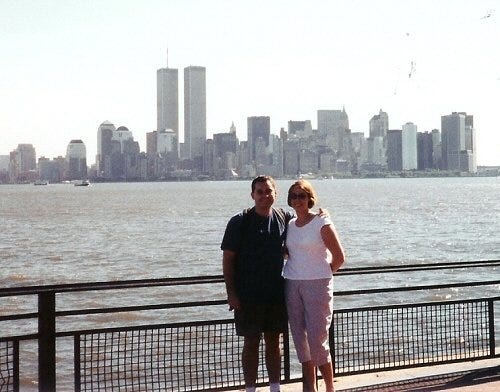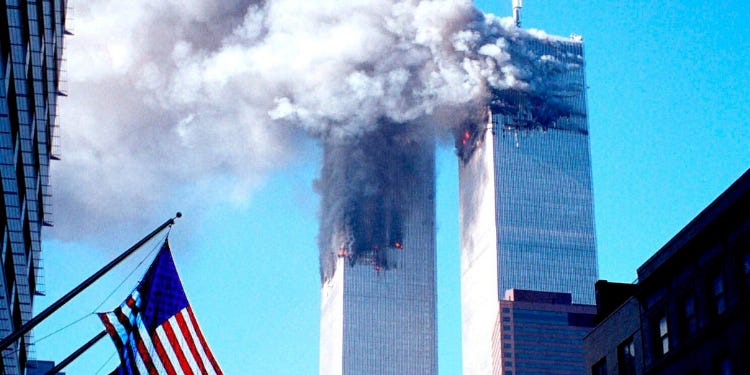This week will mark the 20th anniversary of 9/11. It’s hard to believe it’s been two decades since that horrific day — a day that’s seared forever in so many our minds. Even watching the images and video all these years later (as my wife and I have been doing lately through a Netflix documentary series called “Turning Point: 9/11 and the War on Terror”), the emotions still linger.
Like everyone else, I remember where I was and what I was doing that day. I worked as a developer at a software company, and at the time (as long described in my author profile below), I couldn’t have cared less about world events or politics. I had absolutely no interest in either, though I did vote (for the first time) just a year earlier for George W. Bush.
By the time I got to work that morning, the first plane had already crashed into the north tower of the World Trade Center. In the office break room, where there was a television set, colleagues were watching live video of smoke pouring out from around the 80th floor of the 110-story building.
The sight likely struck a sharper nerve with me than many of my co-workers, because I had just been in New York City a few weeks earlier with my fiancé. In fact, that’s where I proposed to her (she thankfully said 'yes'), in the Rainbow Room on the 65th floor of Rockefeller Plaza. Earlier that day, we had taken a ferry over to Liberty Island where a stranger was kind enough to snap a picture of the two of us in front of the Twin Towers.

I remembered being blown away by the sheer size and height of the buildings, so seeing one of them with smoke billowing out of a gaping hole was extraordinary.
At the time, as we all know, news organizations were speculating that it was a small, private plane that had struck the tower. The explanation made sense in my mind, but just seconds after leaving the break room to walk down the hallway to my office, the shouts and loud gasps of the co-workers I’d just left brought me scurrying back.
“Another plane just hit the other tower!” one of them told me as I gazed in horror at the flamed-filled sky.
It was that precise moment when pretty much everyone figured out what was going on. I say “pretty much,” because I still wasn’t getting it.
“How can that happen?” I asked the room. “Some kind of navigational issue, with air-traffic control?”
Another co-worker, with his arms crossed in front of his chest, turned his head from the screen just long enough to say to me, “Terrorists.”
My eyes bulged and my heart dropped to my stomach. My mind couldn't process the notion that these acts had been carried out on purpose, but it was the only explanation.
The rest of the morning was a relentless assault of unconscionable sights, shock, and confusion. A third plane struck the Pentagon. Office workers in New York chose to leap to their death rather than burn alive, before the towers collapsed and ash and debris filled the streets and air. A fourth plane went down in a Pennsylvania field, with reports of other hijackings coming in (they turned out to be false). Thousands of Americans were assuredly dead, and no one knew what horrors were coming next.
None of it — any of it — made sense to me.
In the days and weeks that followed, we mourned the dead and held out hope for the missing. We stayed glued to our televisions where we watched the recovery efforts, learned about Osama bin Laden and al-Qaeda, and absorbed new potential threats to our country. We learned about countless acts of American heroism, including aboard United Flight 93. We watched President George W. Bush rise to the occasion, the country unite and rally behind him, and the American flag riding high in the air — everywhere — as we awaited military action in Afghanistan.
Like many people, I became a news junkie, and sponged up as much information as I could. If there were ever a time to become addicted to national news coverage and analysis, it was then. It may be hard for some to remember, but during those first few months after 9/11, the networks and papers largely managed to set aside their partisan and ideological inclinations. They covered the attack on our nation and the preparation for war quite professionally and responsibly. In fact, there wasn’t a whole lot of difference between the content you’d see on Fox News, CNN, MSNBC, and the major networks. People were playing it straight.
My newfound interest in the media, politics, and world happenings wasn’t just about the crisis at hand. I genuinely felt irresponsible and even embarrassed for previously having such little knowledge of the things going on outside my own little world. I wanted to be an informed citizen, and ever since then, I’ve worked to become one.
That journey has included political involvement, a lasting interest in conservatism and media integrity, and a platform for writing about those things here and elsewhere. So, for those of you who get upset or offended by my views on this website — often because they don’t conform with your preferred political narratives — I guess you can go ahead and blame that on 9/11.
Looking back, that day and the months that followed were nothing short of surreal. It’s still hard to believe it all happened, but at the risk of offending Truthers, it very much did. And the world changed because of it. That’s a big part of why it’s so hard for me to swallow our full withdrawal from Afghanistan last month, which predictably invited widespread chaos, suffering, and terrorism back throughout the country… for no other reason than politics.
For me, it’s impossible to escape the irony of our 20-year conflict beginning with Americans falling to their death from buildings in New York City, and ending with Afghan citizens falling from U.S. airplanes in an attempt to escape the same enemy we had held the line against. We’ve spent a lot of blood and treasure to successfully protect our homeland from another large-scale terrorist attack, and our presence in Afghanistan had achieved a status quo that was highly advantageous to both of our countries. But we needlessly chose defeat, thus assuring we’ll have to spend much more blood and treasure there in the future, under far more difficult circumstances.
However, on Saturday — this year’s anniversary of 9/11, I’d much rather think about and honor those who lost their lives that day. I also want to recognize our brave soldiers who died or otherwise sacrificed to keep the rest of us safe from Islamic terrorism. And let’s not forget their families and friends who have suffered and mourned as well.
The phrase "Never forget" may have become cliche in regard to 9/11, but I don't really care. We shouldn't forget what happened that day, and though a lot of young people will never appreciate the significance of that event, us older folks shouldn't be reluctant to teach them about it... even if our political leaders are no longer interested.
Sean Coleman is back in John A. Daly's upcoming thriller novel, “Restitution.” Click here to pre-order.




